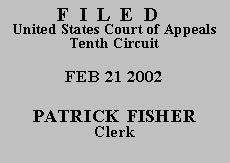

| SAMUEL CLAY WILHOIT, |
|
Petitioner was convicted after a jury trial of one count of possession of a firearm after former conviction of a felony, one count of eluding a police officer, one count of reckless driving, and two counts of failure to stop at a stop sign. The court sentenced Petitioner to thirty-five years on the possession of a firearm count, to be served consecutively with the remaining counts. In his petition, Petitioner seeks relief only on the possession of a firearm conviction. Petitioner sought a direct appeal of his conviction to the Oklahoma Court of Criminal Appeals ("OCCA") which affirmed the conviction in a summary opinion. Petitioner did not seek post-conviction relief in Oklahoma, however, the State concedes that he has exhausted his state court remedies. R. Doc. 7 at 2.
In his original petition before the United States District Court, Petitioner raised three grounds for relief: (1) the OCCA violated his due process and equal protection rights with its summary opinion that failed to address whether the statute under which he was charged, Okla. Stat. tit. 21, § 1283(A), applied to his conduct; (2) the evidence was insufficient to prove he was guilty under § 1283(A); and (3) the state trial court allowed the State to present irrelevant and prejudicial evidence. After referral of the matter from the district court and receipt of the State's response, the magistrate judge issued a thorough Report and Recommendation, recommending dismissal of the petition. R. Doc. 12. After Petitioner filed an objection to the magistrate's Report and Recommendation and the State filed a response, the district court adopted the Report and Recommendation and denied the petition. R. Doc. 16.
In this appeal, Petitioner raises two issues: (1) that in light of his asserted "actual and factual innocence" of the firearm possession statute, both the Oklahoma trial court and the OCCA should have ensured jurisdiction over his case; and (2) that the federal district court failed to address his "actual and factual innocence claim." Aplt. Br. at 16. Petitioner's first issue is at bottom an attack on the state courts' construction of the firearm possession statute, a construction to which we are bound in habeas review. See Dennis v. Poppel, 222 F.3d 1245, 1257 (10th Cir. 2000) (citing Missouri v. Hunter, 459 U.S. 359, 368 (1983)). As to Petitioner's second contention, we agree with the magistrate's Report and Recommendation concluding that the State presented sufficient circumstantial evidence to support his conviction and that the OCCA's resolution of this issue is not contrary to or an unreasonable application of federal law. 28 U.S.C. § 2254(d)(1); R. Doc. 12 at 57.
We have carefully reviewed Petitioner's request for a COA, his appellate brief, the magistrate judge's recommendation, and the appellate record, and conclude that he has failed to demonstrate that the issues raised are debatable among jurists, that a court could resolve the issues differently, or that the questions presented deserve further proceedings. See Slack v. McDaniel, 529 U.S. 473, 48384 (2000). As such, Petitioner has failed to make the "substantial showing of the denial of a constitutional right" required for a COA. 28 U.S.C. § 2253(c)(2).
Accordingly, for substantially the reasons set forth by the magistrate judge, we DENY Petitioner's request for a COA and IFP and DISMISS his appeal.
Entered for the Court
Paul J. Kelly, Jr.
Circuit Judge
*. This order and judgment is not binding precedent, except under the doctrines of law of the case, res judicata, and collateral estoppel. This court generally disfavors the citation of orders and judgments; nevertheless, an order and judgment may be cited under the terms and conditions of 10th Cir. R. 36.3.
2. After examining the briefs and the appellate record, this three-judge panel has determined unanimously that oral argument would not be of material assistance in the determination of this appeal. See Fed. R. App. P. 34(a); 10th Cir. R. 34.1(G). The cause is therefore ordered submitted without oral argument.